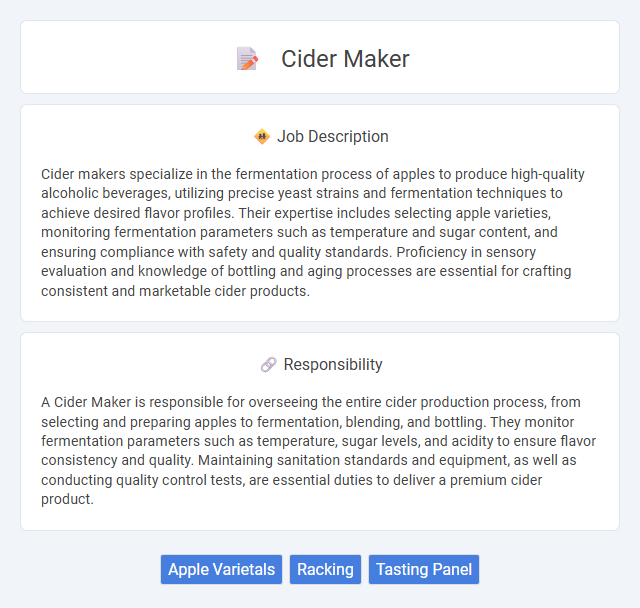
Cider makers specialize in the fermentation process of apples to produce high-quality alcoholic beverages, utilizing precise yeast strains and fermentation techniques to achieve desired flavor profiles. Their expertise includes selecting apple varieties, monitoring fermentation parameters such as temperature and sugar content, and ensuring compliance with safety and quality standards. Proficiency in sensory evaluation and knowledge of bottling and aging processes are essential for crafting consistent and marketable cider products.
Individuals with a passion for fermentation and attention to detail are likely to be suitable for a cider maker role, as it demands precision and patience throughout the brewing process. Those who thrive in hands-on, physically active environments may find this job aligns well with their skills and interests. However, people sensitive to repetitive tasks or working in fluctuating temperatures might face challenges adapting to the conditions of cider production.
Qualification
Cider Makers must possess in-depth knowledge of fermentation processes, fruit selection, and quality control techniques to ensure superior cider production. Proficiency in operating and maintaining brewing equipment, coupled with skills in sensory evaluation and chemical analysis, is essential. A background in food science, microbiology, or related fields alongside hands-on experience enhances the ability to craft consistent and high-quality cider products.
Responsibility
A Cider Maker is responsible for overseeing the entire cider production process, from selecting and preparing apples to fermentation, blending, and bottling. They monitor fermentation parameters such as temperature, sugar levels, and acidity to ensure flavor consistency and quality. Maintaining sanitation standards and equipment, as well as conducting quality control tests, are essential duties to deliver a premium cider product.
Benefit
Working as a cider maker likely offers the benefit of engaging in a creative and hands-on process to produce unique, artisanal beverages. There is probably potential for career growth within the craft beverage industry, along with opportunities to work in dynamic environments such as orchards and breweries. Employees might also experience satisfaction from contributing to sustainable practices through the use of natural ingredients and traditional fermentation techniques.
Challenge
The role of a cider maker likely involves overcoming challenges related to balancing flavor profiles and managing fermentation variables to ensure product consistency. It probably requires adapting to seasonal changes in apple quality and navigating equipment maintenance issues. Problem-solving skills are essential to address unexpected bacterial contamination or deviations in acidity levels.
Career Advancement
Cider makers gain expertise in fermentation processes, quality control, and flavor development, creating a strong foundation for career advancement in craft beverage production. Mastery in equipment operation and knowledge of agricultural sourcing can lead to supervisory roles or positions in product development and brand management. Consistent innovation and collaboration with marketing teams often open pathways to executive roles within the beverage industry.
Key Terms
Apple Varietals
Cider makers expertly select and blend specific apple varietals such as bittersweet Dabinett, sharp Kingston Black, and aromatic Michelin to craft balanced and flavorful ciders. Understanding the sugar, tannin, and acid profiles of each apple type is essential for optimizing fermentation and achieving desired taste profiles. Mastery of apple varietal characteristics directly influences cider quality, complexity, and market appeal.
Racking
Racking is a critical process in cider making that involves transferring cider from one container to another to separate it from sediment and clarify the liquid. This step enhances the cider's quality by preventing off-flavors caused by yeast and other particles settling during fermentation. Precision and cleanliness during racking ensure optimal taste and stability, contributing significantly to the overall production of premium cider.
Tasting Panel
Cider makers participate in tasting panels to evaluate the flavor profile, aroma, and mouthfeel of their products, ensuring quality and consistency across batches. They analyze sensory characteristics such as sweetness, acidity, tannins, and fermentation notes to refine recipes and meet consumer preferences. Expertise in sensory analysis and attention to subtle variations are critical for producing award-winning, balanced ciders.
 kuljobs.com
kuljobs.com